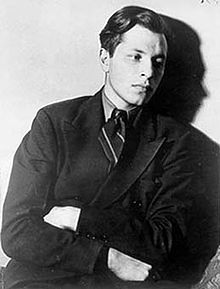Love And Marilyn Monroe (after Spillane)
by Delmore Schwartz
Let us be aware of the true dark gods
Acknowledgeing the cache of the crotch
The primitive pure and pwerful pink and grey
private sensitivites
Wincing, marvelous in their sweetness, whence rises
the future.
Therefore let us praise Miss Marilyn Monroe.
She has a noble attitude marked by pride and candor
She takes a noble pride in the female nature and torso
She articualtes her pride with directness and exuberance
She is honest in her delight in womanhood and manhood.
She is not a great lady, she is more than a lady,
She continues the tradition of Dolly Madison and Clara
Bow
When she says, "any woman who claims she does not like
to be grabbed is a liar!"
Whether true or false, this colossal remark
states a dazzling intention...
It might be the birth of a new Venus among us
It atones at the very least for such as Carrie Nation
For Miss Monroe will never be a blue nose,
and perhaps we may hope
That there will be fewer blue noses because
she has flourished --
Long may she flourish in self-delight and the joy
of womanhood.
A nation haunted by Puritanism owes her homage and
gratitude.
Let us praise, to say it again, her spiritual pride
And admire one who delights in what she has and is
(Who says also: "A woman is like a motor car:
She needs a good body."
And: "I sun bathe in the nude, because I want
to be blonde all over.")
This is spiritual piety and physical ebullience
This is vivd glory, spiritual and physical,
Of Miss Marilyn Monroe.
A Dream Of Whitman Paraphrased, Recognized And Made More Vivid By Renoir
Twenty-eight naked young women bathed by the shore
Or near the bank of a woodland lake
Twenty-eight girls and all of them comely
Worthy of Mack Sennett's camera and Florenz Ziegfield's
Foolish Follies.
They splashed and swam with the wondrous unconsciousness
Of their youth and beauty
In the full spontaneity and summer of the fieshes of
awareness
Heightened, intensified and softened
By the soft and the silk of the waters
Blooded made ready by the energy set afire by the
nakedness of the body,
Electrified: deified: undenied.
A young man of thirty years beholds them from a distance.
He lives in the dungeon of ten million dollars.
He is rich, handsome and empty standing behind the linen curtains
Beholding them.
Which girl does he think most desirable, most beautiful?
They are all equally beautiful and desirable from the gold distance.
For if poverty darkens discrimination and makes
perception too vivid,
The gold of wealth is also a form of blindness.
For has not a Frenchman said, Although this is America...
What he has said is not entirely relevant,
That a naked woman is a proof of the existence of God.
Where is he going?
Is he going to be among them to splash and to laugh with them?
They did not see him although he saw them and was there among them.
He saw them as he would not have seen them had they been conscious
Of him or conscious of men in complete depravation:
This is his enchantment and impoverishment
As he possesses them in gaze only.
. . .He felt the wood secrecy, he knew the June softness
The warmth surrounding him crackled
Held in by the mansard roof mansion
He glimpsed the shadowy light on last year's brittle leaves fallen,
Looked over and overlooked, glimpsed by the fall of death,
Winter's mourning and the May's renewal.
All Night, All Night
"I have been one acquainted with the night" - Robert Frost
Rode in the train all night, in the sick light. A bird
Flew parallel with a singular will. In daydream's moods and
attitudes
The other passengers slumped, dozed, slept, read,
Waiting, and waiting for place to be displaced
On the exact track of safety or the rack of accident.
Looked out at the night, unable to distinguish
Lights in the towns of passage from the yellow lights
Numb on the ceiling. And the bird flew parallel and still
As the train shot forth the straight line of its whistle,
Forward on the taut tracks, piercing empty, familiar --
The bored center of this vision and condition looked and
looked
Down through the slick pages of the magazine (seeking
The seen and the unseen) and his gaze fell down the well
Of the great darkness under the slick glitter,
And he was only one among eight million riders and
readers.
And all the while under his empty smile the shaking drum
Of the long determined passage passed through him
By his body mimicked and echoed. And then the train
Like a suddenly storming rain, began to rush and thresh--
The silent or passive night, pressing and impressing
The patients' foreheads with a tightening-like image
Of the rushing engine proceeded by a shaft of light
Piercing the dark, changing and transforming the silence
Into a violence of foam, sound, smoke and succession.
A bored child went to get a cup of water,
And crushed the cup because the water too was
Boring and merely boredom's struggle.
The child, returning, looked over the shoulder
Of a man reading until he annoyed the shoulder.
A fat woman yawned and felt the liquid drops
Drip down the fleece of many dinners.
And the bird flew parallel and parallel flew
The black pencil lines of telephone posts, crucified,
At regular intervals, post after post
Of thrice crossed, blue-belled, anonymous trees.
And then the bird cried as if to all of us:
0 your life, your lonely life
What have you ever done with it,
And done with the great gift of consciousness?
What will you ever do with your life before death's
knife
Provides the answer ultimate and appropriate?
As I for my part felt in my heart as one who falls,
Falls in a parachute, falls endlessly, and feel the vast
Draft of the abyss sucking him down and down,
An endlessly helplessly falling and appalled clown:
This is the way that night passes by, this
Is the overnight endless trip to the famous unfathomable
abyss.
For The One Who Would Take Man's Life In His Hands
Tiger Christ unsheathed his sword,
Threw it down, became a lamb.
Swift spat upon the species, but
Took two women to his heart.
Samson who was strong as death
Paid his strength to kiss a slut.
Othello that stiff warrior
Was broken by a woman's heart.
Troy burned for a sea-tax, also for
Possession of a charming whore.
What do all examples show?
What must the finished murderer know?
You cannot sit on bayonets,
Nor can you eat among the dead.
When all are killed, you are alone,
A vacuum comes where hate has fed.
Murder's fruit is silent stone,
The gun increases poverty.
With what do these examples shine?
The soldier turned to girls and wine.
Love is the tact of every good,
The only warmth, the only peace.
"What have I said?" asked Socrates.
"Affirmed extremes, cried yes and no,
Taken all parts, denied myself,
Praised the caress, extolled the blow,
Soldier and lover quite deranged
Until their motions are exchanged.
-What do all examples show?
What can any actor know?
The contradiction in every act,
The infinite task of the human heart."
Delmore Schwartz (December 8, 1913 – July 11, 1966) was an American poet and short story writer. Much of Schwartz's work is notable for its philosophical and deeply meditative nature, and the literary critic, R.W. Flint, wrote that Schwartz's stories were "the definitive portrait of the Jewish middle class in New York during the Depression." In particular, Schwartz emphasized the large divide that existed between his generation (which came of age during the Depression) and his parents' generation (who had often come to the United States as first-generation immigrants and whose idealistic view of America differed greatly from his own).
He was unable to repeat or build on his early successes later in life as a result of alcoholism and mental illness, and his last years were spent in reclusion at the Columbia Hotel in New York City. In fact, Schwartz was so isolated from the rest of the world that when he died on July 11, 1966, at age 52, of a heart attack, two days passed before his body was identified at the morgue.
The most ambitious literary tribute to Schwartz came in 1975 when Saul Bellow, a one-time protege of Schwartz's, published his Pulitzer Prize-winning novel Humboldt's Gift which was based on his relationship with Schwartz. Although the character of Von Humboldt Fleischer is Bellow's portrait of Schwartz during Schwartz's declining years, the book is actually a testament to Schwartz's lasting artistic influence on Bellow.
Home

